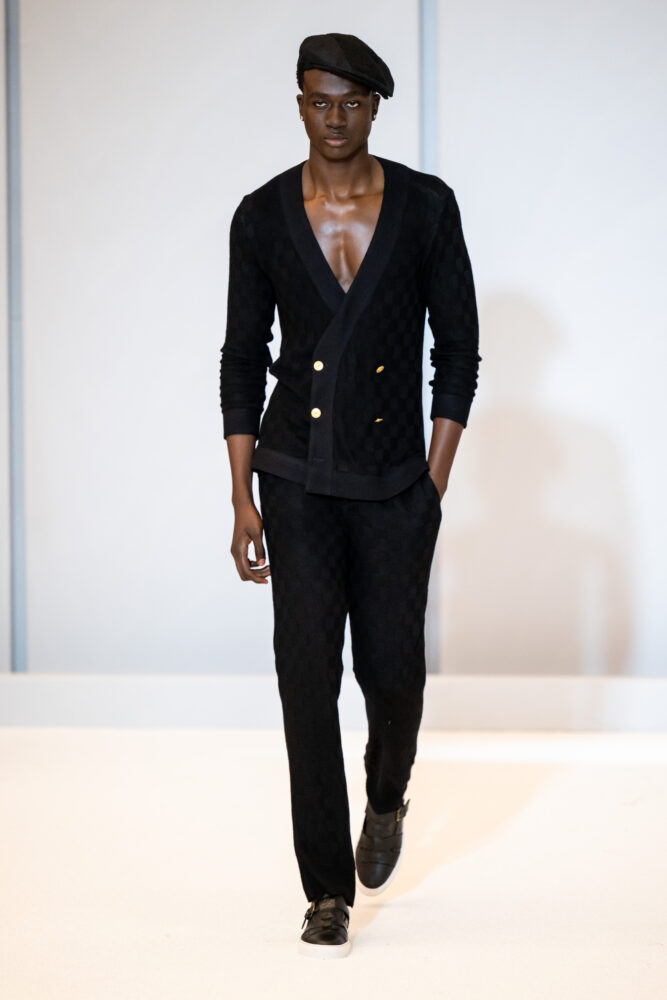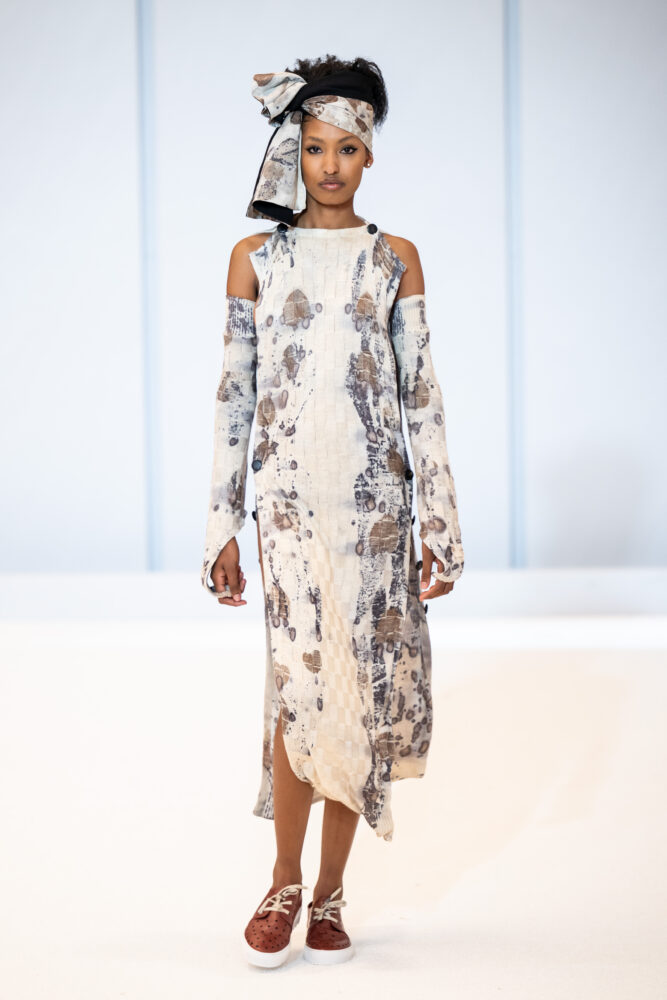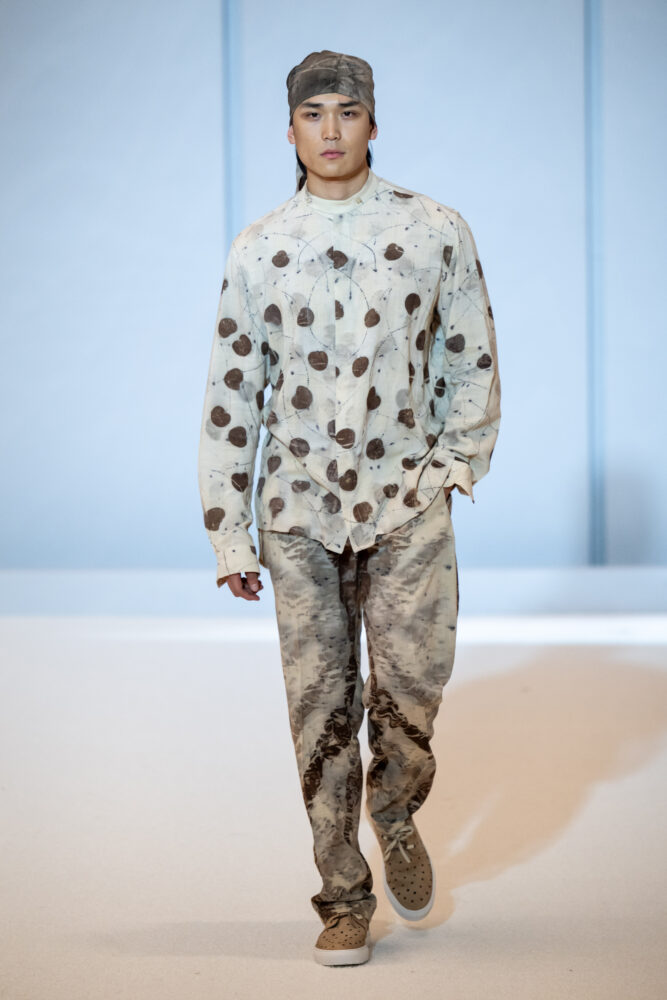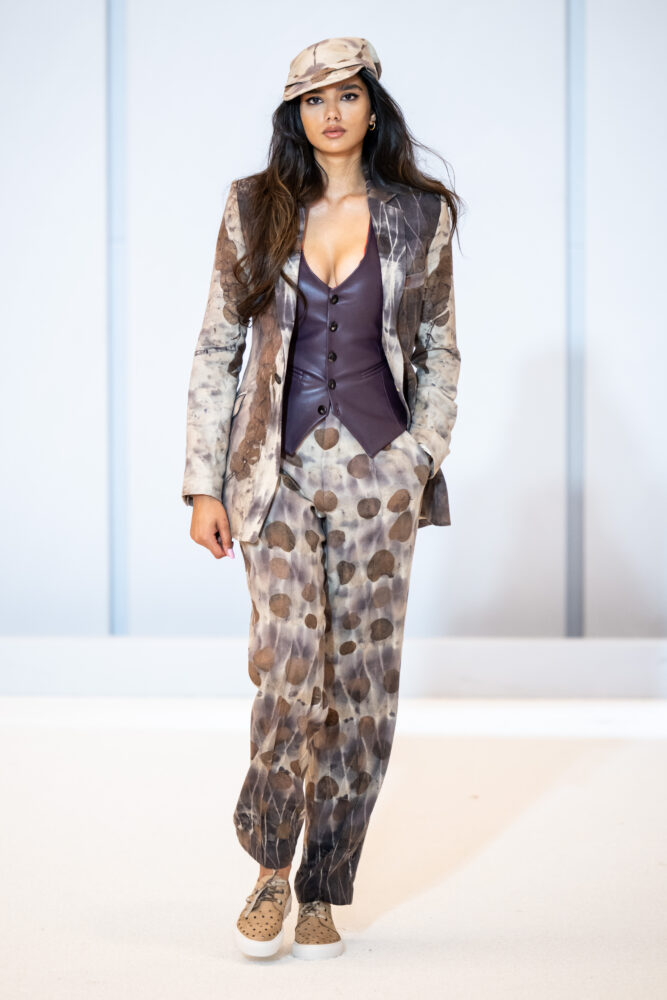South African fashion designer Shaldon Kopman
If there is one show I look forward to every year at South African Fashion Week, it is Naked Ape.
The garments — crisp in structure yet gentle in movement — seem to glide rather than walk. They speak without words, holding stories in their folds. They are not just beautiful; they are cared for, loved even.
I attend — by invite, of course — and every time, I leave different.
Urban Camo, the collection that was showcased at SA Fashion Week, continues the brand’s legacy with fluid tailoring and raw beauty, featuring a collaboration with botanical artist Ira Bekker, whose eco-printed textiles — created using natural pigments from leaves, branches and rusted metal — infuse the collection with richly detailed, tactile and one-of-a-kind patterns.
For the longest time, I was drawn to the collection but distant from the creator. I’d watch Shaldon Kopman from afar — always sharp, always understated — taking his bow at the end of his shows.
I’d often feel a quiet awe, not so much intimidated by his presence as by the boldness of his choices. There was a fearlessness in his silhouettes, a truth-telling in his tailoring. His clothes did not shout. They whispered deeply.
Eventually, I gathered my courage. I called him — a WhatsApp call, if I’m being honest. My wallet wasn’t in the best shape that week, and wi-fi would have to do.
What I got on the other end of the line was a surprise — not a distant icon, but a man fully alive: “Hello!” His voice was warm, animated — with a passion as vibrant as the garments he creates.

 Not monkeying around: South African fashion designer Shaldon Kopman’s Naked Ape collection on the runway at this year’s South African Fashion Week.The brand believes in slow fashion — making garments that last for years, not just one season.
Not monkeying around: South African fashion designer Shaldon Kopman’s Naked Ape collection on the runway at this year’s South African Fashion Week.The brand believes in slow fashion — making garments that last for years, not just one season.
“When the brand was conceptualised, it was more about an evolutionary wardrobe,” he tells me. And just like that, we’re in it — no pretence, no over-explaining. Just truth.
He’s talking about clothes that evolve with you, hold their place in your wardrobe for years, not seasons.
“No compromise when it comes to fabrication,” he says. “No compromise in tailoring or finishing.”
Naked Ape was born in 2010, almost 15 years ago. From the beginning, it’s held the kind of integrity that most brands are only now beginning to discover: biodegradable textiles — wool, linen, silks, leathers, bamboo, hemp, cotton, rayon.
Textiles that breathe. Materials that return to the earth. A brand built on slow fashion long before it became a survival tactic.
Naked Ape is not only sustainable in materials. It is sustainable in soul.
Kopman tells me about his move to Johannesburg as a child — from Pietermaritzburg, at the age of nine.
“My eyes were as wide as saucers,” he laughs. What caught those young eyes wasn’t just the skyline or the hustle — it was the people. The way they dressed. The way they moved with intention.
“In Kliptown, Soweto, people loved clothing,” he says, the memory as vivid as yesterday. “To thrive in a community, you need to look good.”
There it is again — not vanity, but pride. A belief that self-presentation is not superficial, but cultural.
These early lessons seeped into his adult life. As he began to understand his own body — wider shoulders, narrower waist, longer arms — he realised that the clothes available weren’t made for him.
They weren’t made for African men. So, he started tailoring his own. And, after being named GQ Best Dressed Man in 2006, he made a quiet vow — he would wear only what he had designed.
Not out of arrogance. Out of necessity.
By the third Naked Ape collection in 2011, something had clicked.

 A cut above: Naked Ape’s range of clothing is modern but rooted in African tradition.
A cut above: Naked Ape’s range of clothing is modern but rooted in African tradition.
“That collection was a defining moment,” he reflects. “It showed me that there’s a proper future here — a well-rooted African brand with strong conceptual ideas.”
Lacking fancy machinery, they improvised. That improvisation birthed a new language of style —street tailoring. A genre not quite classic, not quite urban, but fully alive. Grit meets grace. Modern tailoring rooted in African narrative.
In his studio, sampling is not a phase — it is the heart.
“That’s where the investment is,” Kopman says.
The garments undergo an almost sacred process. They are hand-dyed using plant matter, embroidered, printed, beaded. The fabric is not simply worn — it is spoken through.
But Kopman is also unflinching about the complexities of the work.
“Fabrication is not always sustainable. That’s why we find ourselves in a slow-fashion environment.”
In a world that rewards speed, Naked Ape insists on intention. On pause. On reflection.
In 2014, he formalised that ethos with a principle he calls “Ethni Eco2” — ethical economic and ecological.
“People think economical means cheap, but it means least impact. It means ‘buy less, wear more’.”
He smiles and shrugs, “Not a great business model … but the right one.”
Kopman has a vision that stretches beyond his brand. He speaks about the South African fashion ecosystem with the clarity of someone who has both lived and loved it deeply.
“We are a very creative nation,” he says. “Like Italy. Like Japan. But they invest in their creative economies.”
For Kopman, this is not nostalgia; it’s strategy: “We want ‘Made in South Africa’ to mean excellence. That requires all of us — designers, buyers, wearers — to commit.”
He refuses to accept a polyester landscape for African fashion.
Before we end the call, I ask him what he would tell his younger self. He laugh. “Curb your enthusiasm. Numb your optimism.”
He recounts how he once went bankrupt, investing everything in a show. “That moment forced me to rethink. It made me better. So … just keep on keeping on.”
It’s a phrase I carry with me long after our conversation ends. Just keep on keeping on. A mantra for the creative soul. For anyone building something meaningful in a world addicted to the quick and the cheap.
As I close my notebook, I think again about Naked Ape. About the clothes that move like poetry across a runway. About garments that don’t just clothe but commemorate. I think about heritage. About what it means to dress with memory.
Kopman is not just dressing bodies — he’s dressing consciousness. Stitching identity into fabric. And as long as Naked Ape keeps walking those runways, I’ll keep watching. Always by invite.